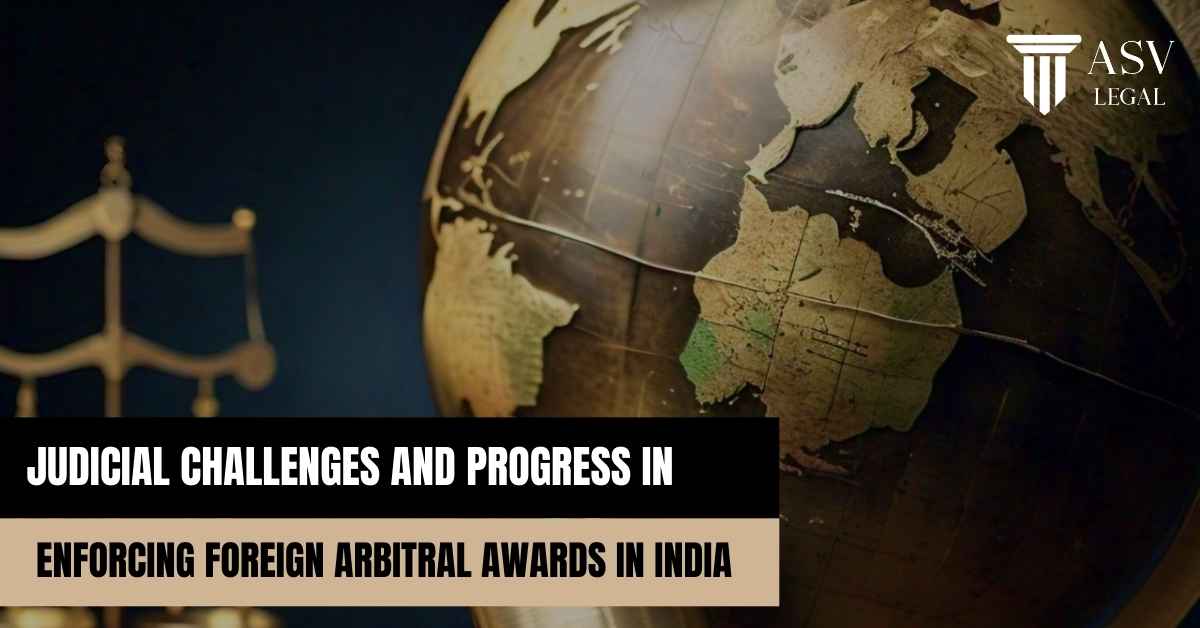Written By: Tanushvi Singh
Arbitration has become the most common of settling disputes, particularly in commercial disputes, because it is faster, confidential, and cost effective as compared to litigation. It must be noted that the success of each arbitral process is dependent not only on the arbitration but also on how well the arbitral award is executed. The need for the timely execution of such awards especially if they are foreign arbitral awards is essential in order to ensure that Parties to the Arbitration reap full benefits of Arbitration process. In India, Part II of the Arbitration and Conciliation Act of 1996 (“the Act”) sets forth a clear procedure for the enforcement of international arbitral awards.
An arbitral award is the decision that an arbitral tribunal renders in an arbitration proceeding. This provision is of such importance since an award is as good as a judgment of the court; it can contain orders for injunctions, specific performance, rectification, cancellation of deeds, monetary orders, and declarations so disposed of in arbitration and the same was clarified in the case of Olympus Superstructures Pvt. Ltd. vs Meena Vijay Khetan & Ors.[1]
Evolution of Foreign Arbitral Award Enforcement in India
India has made remarkable strides in the area of arbitration, particularly with respect to enforcement of foreign arbitral awards. Over the years, India has made efforts to bring its legal system in line with international practices, largely encouraged by the New York Convention, 1958, and the Arbitration and Conciliation Act, 1996. The development of consistent judicial interpretations and positive legislative changes has evidenced India’s movement toward the pro-arbitration culture.
Mechanism for Enforcing Foreign Arbitral Awards
India is a signatory to the New York Convention, which is crucial for recognizing and enforcing foreign arbitral awards. Part II of the Arbitration and Conciliation Act, 1996 deals with the enforcement of foreign awards under this Convention.
Recognition and Enforcement: Under Sections 44-52 of the Act[2], foreign awards are enforceable in India if:
- The award is made in a country that is a signatory to the New York Convention.
- The award is made in a country notified by the Indian government as a reciprocating territory.
The process involves three key steps:
- The party seeking enforcement must apply under Section 47 of the Act, providing supporting documents.
- The opposing party can raise defences under Section 48 of the Act.
- The court then decides whether to enforce the award under Section 49 of the Act, considering the defences raised.
Judicial Trends Towards Pro-Enforcement
According to recent trends, Indian courts in the past few years have been more receptive to arbitration, particularly in the recognition and enforcement of the foreign arbitral awards. The Legal policy shifted when the Supreme Court delivered its landmark judgment in Bhartia Aluminium Company (BALCO) V. Kaiser Aluminium Technical Services (2012)[3]. Supreme Court of India departed from its previous judgement in Bhatia International v. Bulk Trading S.A[4] where it held that an intervention in domestic arbitration was relevant where there was an ‘arbitration’ within India, on its part to foreign seated arbitrations. This decreased the domestic approach from Indian courts to foreign arbitrations and hence increased the likelihood of India being treated as a favourable seat for enforcement of the foreign arbitral awards.
Likewise in NTT Docomo Inc. v. Tata Sons Ltd.[5] The Reserve Bank of India’s objections were ignored by the Delhi High Court showing India’s friendly policy towards foreign investment and finality of awards in international arbitration. The court held that enforcement of an international award severely outweighs the procedural restrictions imposed by foreign exchange laws or reliance on conciliatory arrangements reached as per the Civil Procedure Code.
Challenges in Enforcing Foreign Arbitral Awards
Although these trends are positive, there are still some areas that need improvement especially as far as enforcement of foreign arbitral awards is concerned. Section 48 of the Act outlines the legal limitations in which the enforcement can be resisted, especially on the incapacity of the parties, the award being outside the arbitration agreement and pre-determined liability being the three main issues on step arbitrations or any action contrary to the public policy of India .
The institutional timeliness in enforcement actions is similarly plagued by procedural hurdles in which the enforcing parties will use underlying procedural weaponry to sleep execution.
The public policy exception is one of the most debated grounds for refusing the enforcement of foreign arbitral awards. In India, it has evolved through significant judicial scrutiny. In Renusagar Power Co. Ltd. v. General Electric Co.[6], the Supreme Court limited this exception to cases where the award contravenes the fundamental policy of Indian law, is against India’s interests, or is contrary to justice or morality. In Shri Lal Mahal Ltd. v. Progetto Grano Spa[7], the court further narrowed the scope, holding that enforcement can only be refused if there is a violation of India’s fundamental policy, not merely a contravention of Indian law. This evolution reflects a shift towards minimal judicial intervention and promoting the enforcement of foreign awards in line with international standards, though the discretion still allowed to Indian courts has sometimes resulted in inconsistent decisions.
Conclusion
It is important that they should be given utmost importance as these enhance the credibility and efficiency especially of arbitration as a means of resolving disputes. The trend in recent years especially in landmark rulings has been that Indian courts are becoming more and more pro enforcement of foreign arbitral awards. Some aspects are still outstanding that need to be worked on especially in terms of procedural delays and in the broader implementation of the public policy over the arbitration forum. However, there have been notable improvements made within the judiciary from the tendency of providing unnecessary interference on the enforcement of foreign arbitration awards which paves way for strengthening the status of India as an arbitration friendly jurisdiction
[1] Olympus Superstructures Pvt. Ltd. Vs Meena Vijay Khetan & Ors. AIR 1999 SUPREME COURT 2102
[2] Section 44-52 of the Arbitration and Conciliation Act, 1996.
[3] Bharat Aluminium Co. (BALCO) v. Kaiser Aluminium Technical Services, (2012) 9 SCC 552
[4] Bhatia International vs Bulk Trading S. A. & Anr 2002 (4) SCC 105
[5] NTT Docomo Inc. v. Tata Sons Ltd.2017 SCC OnLine Del 8078
[6] Renusagar Power Co. Ltd. v. General Electric Co.1994Supp(1)SCC644



